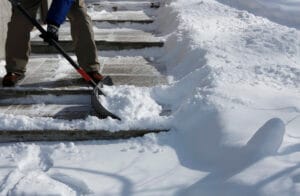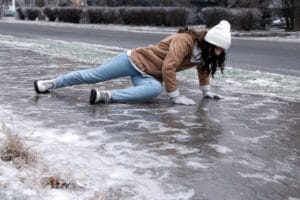
Falling on a patch of ice is painful and can be downright dangerous. Who is legally responsible for a fall when ice or snow is involved? This is a question that comes up every winter in Chicago. Victims of un-shoveled or badly shoveled sidewalks want to know if the homeowner can be held liable, and homeowners wonder if they are required to shovel.
Shoveling is not legally required of homeowners
There is a law in Illinois to address the liability of homeowners if someone falls on their icy sidewalk. It is called the Illinois Snow and Ice Removal Act and it was passed in 1979. It protects the homeowner from being legally responsible for injuries, unless the homeowner acted in a way that was “willful or wanton”. An example would be deliberately pouring water on the sidewalk so that it would freeze. The law does not protect business owners or commercial properties.
Watch out for Unnatural Accumulations of Snow and Ice
The “unnatural accumulation” rule is a loophole and allows for a homeowner to be held liable for injuries on their property if they did something to cause the snow or ice to form in a manner that is somehow unnatural. For example, if there were a problem with the underlying sidewalk, like a large crack that caused freezing water to somehow “slope” in a way that it would not on an otherwise level sidewalk, liability could result. Another often-seen example is the piles of snow that we all have seen in parking lots. They are often so large that they will thaw and freeze several times throughout the winter before finally melting completely. The resulting drainage then forms un-naturally because it the snow was piled up by humans (or rather, their plows) and not by mother nature.
No Need to Shovel under Illinois Law
Since homeowners aren’t responsible for snow and ice that was naturally put on the property, they aren’t required to warn against it, to remove it, clean it, or shovel it. If there is snow or ice around the outside of your home, you don’t have to do anything about it. The law makes sense if you think about it. If someone is not home or for some other reason cannot shovel or get someone over to shovel, they shouldn’t have to worry about snow or ice forming on or around their property- as this is a situation over which they have no control. The homeowner did not cause the situation, nature did. Since nature put the snow and ice there, the property owner isn’t responsible for it.
Homeowners can even do a bad job shoveling
If you do decide to shovel and do a poor job of it, which results in an injury, you are still shielded. This was clarified by the Illinois Supreme Court in 2016 in the case of Murphy-Hylton v. Lieberman Management Services. The Supreme Court made it clear that if the snow that was shoveled accumulated naturally, the homeowner would essentially be off the hook. Interestingly, the property owner still lost the case because the icy sidewalk was the result of an unnatural condition, namely drainage issues that caused the area to slant.
Different Rules in the City of Chicago when it comes to clearing ice
While state law protects the homeowners, it works a little bit differently at the local level. Cities, villages and towns often have their own rules when it comes to ice and snow. The City of Chicago can fine homeowners for failure to shovel the sidewalks. The Municipal Code of Chicago (4-4-310) mandates keeping your sidewalks clear. This holds true regardless of whether or not you are the owner, or simply a tenant or occupant. The City of Chicago is also a stickler for time frames and gives you only three hours to shovel if the snow stops falling before 4:00 pm. If it is later, get it cleared by 10:00 am but don’t worry about it on Sundays. Fortunately for those less fortunate, the city’s Snow Corps Volunteer program connects people in need (the elderly, ill or disabled) with kind volunteers. If you live in the city and are tired of that neighbor who never shovels, call “311” to report it. Fines start at $50.00 and are even higher for business owners. Yikes.
What is the likelihood of success against a homeowner in an Ice Slip and Fall case?
 Lawsuits of this type, when someone falls on snow or slips on ice, are a hassle for the homeowner but generally winnable, for the homeowner. An injured party has to prove the “willful or wanton” conduct, which is unusual. Most injured parties try to prove their cases based on unnatural accumulations. Unless the facts are very clear, people who have fallen may have a hard time with the case. Pictures are helpful, but it can be very hard to prove.
Lawsuits of this type, when someone falls on snow or slips on ice, are a hassle for the homeowner but generally winnable, for the homeowner. An injured party has to prove the “willful or wanton” conduct, which is unusual. Most injured parties try to prove their cases based on unnatural accumulations. Unless the facts are very clear, people who have fallen may have a hard time with the case. Pictures are helpful, but it can be very hard to prove.
Legalities aside, if you can, please shovel or put down salt. This is especially true if you live near a school or another area heavy with foot traffic. Look on the bright side, aside from being neighborly, you can burn around 223 calories in 30 minutes.
As a pedestrian, it is very frustrating to walk on a nicely shoveled sidewalk and then come upon the sidewalk of someone who did not shovel. It may be safer to get off the sidewalk and onto the snowy lawn, as it might be less icy. Use extreme caution in the winter.
In my experience, cases involving falls on ice or snow are hard to prove and hard to win. As a small law firm, primarily handling car accidents, we do not handle cases involving falling on ice, but might be able to refer you to another Schaumburg or Elgin lawyer who can help.
